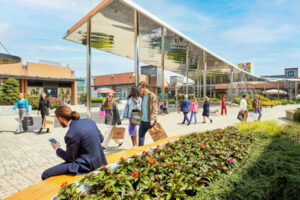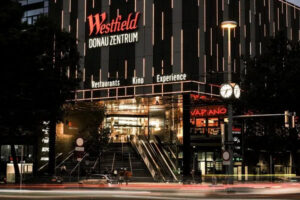ACROSS: How important is customized music programming in retail spaces? Do differences exist across the various European countries?
ARNDT-HELGE GRAP: The use of curated music in retail settings is absolutely essential, because it has a direct impact on consumers and, as a result, a direct influence on them. Music has a subtle, subconscious, but very direct effect on consumers. If the wrong approach is taken, you run the risk of losing out on sales. Playing the right music at the right time puts customers in a positive (buying) mood; however, the wrong music can send them running out of the store because they simply cannot stand the sound or the song. I deal with such issues on a professional basis, and it is my belief that inappropriate music and/or unfavorable sounds and/or the wrong volume can quickly ruin the atmosphere. Incidentally, this is just as true for a private candlelight dinner as it is for a shopping experience. In both cases, you want to feel comfortable. Therefore, we do our best to ensure that customers stay longer, buy more, and come back again. It all boils down to the time of day, the season, and the target audience: The time at which a particular song can be played and at what volume depends on a variety of factors. Andreas Adenauer does not refer to his more than eighty, extremely thoughtfully designed locations between Sylt and Constance as stores, but rather as beach houses. Likewise, the relaxed vibe, the interiors, and, of course, our music selection are just as important. In that respect, Jack Johnson is much more appropriate than Dieter Bohlen. That is not just musically speaking.
One could even take things a step further and say that every fashion collection has its own sound. Our job is to convert a brand world or a store concept into music and, therefore, into the right sound-driven feeling. The ultimate goal is to make people feel at ease and more inclined to consume more items. A number of studies have clearly demonstrated the influence of music on buying mood, well-being, walking speed, and sales.
ACROSS: To what extent has the Covid-19 crisis had an impact?
GRAP: Music is extremely important right now, and it is trendier than ever. At the moment, it is one of the few ways in which we can quickly and easily create a positive atmosphere at each location. Upbeat sounds, such as pop, soul, and funk, are in high demand among our retail customers. In addition, the human voice can be used to arouse emotions in guests and customers: As such, singing is currently more popular than instrumental music. In addition, music is currently being played at significantly higher volumes, in other words, more prominently. Shopping areas, which owe their appeal, in part, to the vibrant atmospheres that are generated by larger crowds, are currently constrained by the safety measures that have been put into place as a result of Covid-19. Well-curated music can be used to fill the vacuum. In the best case scenario, a positive vibe can be restored to the place, or better, the space.
ACROSS: Is there a particular song or piece of music that is popular in stores these days?
GRAP: By no stretch of the imagination is there a universally popular song that serves as a suitable all-purpose, sound-based weapon, so to speak. That would be absurd. The worlds of brands and products are far too diverse for that – and so are the associated store designs, which are, after all, major factors in the appeal of a location. On the other hand, the overall spectrum of music that our editors access is extremely wide-ranging. Therefore, both have to be perfectly coordinated with each other. However, if you would really like to strike a chord, let me put it this way: I can no more imagine an overplayed Ed Sheeran megahit being played at Joop than I can imagine a provocative Kollegah number being played in a Volkswagen showroom.
ACROSS: What advantages do content-driven licensing models offer?
GRAP: Let me explain by giving you an example: We are all used to listening to music on our cell phones – we have been for quite some time. Whether it is Spotify, Amazon Music, or YouTube, we use our smartphones as sound generators at every opportunity, and they also allow us access to podcasts. It would be even more exciting, however, if cell phones could be used as individual multichannel stations, allowing us to combine our favorite music with personal news preferences, podcast broadcasts, and video formats – both when we are online and offline. That is precisely what we deliver to our content license customers: a one-stop, worry-free package that curates the perfect content and plays it based on time, whether online or offline. Customers do not have to worry about content or technology, which is a particularly important factor in times like these, when staffing levels are significantly lower. There is no hassle, no headache, and they are absolutely reliable. That is what our content licensing customers receive from us.
ACROSS: What new technological developments is Radiopark focused on?
GRAP: As previously mentioned, we have developed and patented a technology (EP1953999B1) that can independently create a customized program that transfers content elements – when new ones are available – to cell phones, in the background, and plays them at precisely the right time. At present, this technology is available in the form of a license, but we are currently working on an app that will enable us to introduce it directly to the consumer market. That would expand our business model from the B2B market to the B2C market.
ACROSS: Who are your customers in terms of commercial real estate operators and retailers?
GRAP: A large number of retail clients rank among our customers, and our toníque brand caters to their particular needs and requirements. Our portfolio includes Strellson, Joop, Gebrüder Heinemann, Schubecks, Volkswagen, Adenauer, Ramelow, Meissen, Dallmayr, Konen, and Who’s Perfect. Our services are provided to most of those brands and retailers not only in Germany, but also internationally. In the United Arab Emirates, for example, we also provide services to various shopping malls.





